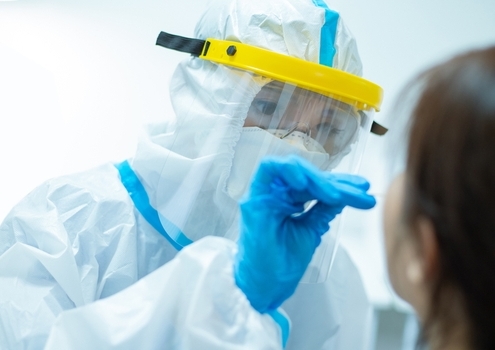Origin Ramps Up Production of 3D-Printed Test Swabs
Origin Ramps Up Production of 3D-Printed Test Swabs
Origin, a 3D printing specialist for medical devices, just completed clinical trials and validation of its 3D-printed nasopharyngeal swabs for use in COVID-19 test kits. It is scaling up production and accepting orders to manufacture millions of the swabs.
The swab was tested and clinically validated at Beth Israel Deaconess Medical Center (BIDMC), an academic medical center affiliated with Harvard Medical School. There, it was part of a safety and efficacy trial involving 3D-printed swabs from multiple companies. Origin’s 3D-printed swab passed a rigorous initial clinical evaluation for human factors, materials testing and PCR compatibility. Full results of the clinical trial are expected to be published shortly.
In addition to BIDMC’s clinical testing, Origin’s 3D-printed swabs have gone through rigorous testing with the U.S. Army, Origin material partners, UCLA and other universities, and independent medical labs.
“The nation’s need for rapid and widespread testing for COVID-19 has been hampered by a widespread shortage of the swabs needed for testing,” said Ramy Arnaout, M.D., D.Phi.l, associate director of the clinical microbiology laboratories at BIDMC. Arnaout leads a multi-disciplinary effort to resolve the shortage and is overseeing the medical center’s clinical evaluations of 3D-printed swabs.
“Innovations in 3D printing hold real promise for our collective efforts to diagnose and treat COVID-19, as well as to flatten the transmission curve,” Arnaout said.
Chris Prucha, Origin co-founder and CEO, said as much during his announcement. “These are unprecedented times that require unprecedented measures. Given this, Origin has made the decision to focus its efforts solely on developing medical devices and PPE during this crisis.”
“This shift happened quickly and under very difficult conditions, as San Francisco (where Origin is headquartered) was the first city to order shelter in place,” he said. “We are pleased to say that the clinical trial results of our test swabs have gone very well, and the positive feedback has enabled us to develop a more comfortable product for patients.”
3D-printing offers an easier manufacturing solution as well as reliability and scalability. And, because the swabs can be sterilized, they can be reused, thus further alleviating the shortage.
Origin worked closely with its Open Material Network to identify the proper medical grade material and to quickly refine optimal processing conditions. Origin One, the manufacturing-grade 3D printer used by Origin, uses programmable photopolymerization to precisely control light, heat and force, among other variables, to produce parts with exceptional accuracy and consistency.
The fine-featured lattice of Origin’s swabs allows detailed geometries to better capture the virus. That flexibility enabled Origin to provide multiple designs, so BIDMC could identify the most effective and most comfortable swabs for patients.
Because the swabs are 3D printed from a single, medical-grade material, no molds are required. Therefore, they can be produced wherever they are needed, anywhere in the world. In eight hours, an Origin One printer can product up to 1,500 swabs in a single print.
In contrast, traditional flocked test swabs are difficult to manufacture. Traditional test swab production is currently limited to only a couple of factories in the world.
Origin isn’t alone among 3D printers focusing on manufacturing nasopharyngeal swabs. A new industry consortium, PrintedSwabs.org, is a bridge between the companies and academia. Its goal is to supply millions of 3D-printed COVID-19 test swabs.
PrintedSwabs.org members includes Carbon/Resolution Medical, FormLabs, Envisiontec, Origin, and OPT, as well as Harvard University, the University of San Francisco, The Ohio State University, Stanford University, and the U.S. Army Combat Capabilities Development Command Soldier Center (Natick).
Coalition member Resolution Medical has developed the Resolution Medical Lattice Swab using Carbon’s Lattice Engine software. The hollow structure of this conformal lattice is designed for specimen collection efficiency, functionality, and patient comfort. It is undergoing clinical evaluation by clinicians at multiple institutions, including BIDMC.
“At scale, we plan to supply over 1 million swabs per week,” Shawn Patterson, founder and president of Resolution Medical, said.
OPT Industries, an MIT Media Lab spinoff, recently developed more than 20 prototype nasal swabs using high resolution 3D printing. Its “hairy” swab design appears to be the most effective of those prototypes, based on evaluations by BIDMC. It is producing thousands of nasal swabs daily
Formlabs’ 3D-printed nasal swab was developed in concert with USF Health’s 3D clinical applications division and tested at Tampa General Hospital, USF Health, and Northwell Health facilities. Clinical validation is complete and manufacturing is beginning.
These consortium members each saw the massive shortage of COVID-19 test kits quickly focused their resources on COVID-19. In the course of two weeks, Origin went from being a 3D printer manufacturer to become a medical device manufacturer. Formlabs had a similar pivot.
For Resolution, the shift was less dramatic. It already was an FDA registered in vitro diagnostic and medical device manufacturer. OPT Industries, likewise, is registered with the FDA.
Combined, these coalition companies can produce up to four million FDA-registered test swabs per week. The consortium said the 3D-printed swabs offer superior or equivalent efficacy to flocked swab.
The PrintedSwabs.org consortium companies also are working on several other 3D-printed PPE projects. Origin, for example, recently worked on an open source project to produce an ANSI-compliant face shield for DLP, SLA, and SLS 3D printers that is considered safer for front line healthcare workers than other currently-available FDM face shield designs.
Origin company also worked with Stanford Engineering on a custom attachment for a full-face snorkeling mask, similar to the N95 mask, that will act as a swap-in replacement for the snorkel tube. This is known as the Pneumask: Reusable Full-Face Snorkel Mask PPE Project.
BioSpace source:
https://www.biospace.com/article/origin-ramps-up-production-of-3d-printed-test-swabs


